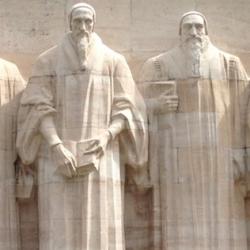All paedobaptists agree that the church is the new Israel, formed as the body of the Risen Christ. But paedocommunion reinforces this point dramatically, for it insists that the admission requirements to the church’s meal are exactly the same as the admission requirements to Israel’s meals.
Ancient Israel celebrated many different meals with various rules for admission. Some food, classified as “most holy,” was reserved exclusively for priests (e.g., Lev. 24:5–9), and “holy food” could be eaten only by the members of a priestly household (e.g., Leviticus 22:10–16). Children and lay adults were excluded from these priestly meals. Since the distinction between the priesthood of Aaron and the priesthood of Israel as a whole has been breached by the new covenant, these regulations are no longer directly relevant to the question of admission to the Lord’s Supper.
What is noteworthy is that all Israelites were permitted to eat at all the feasts of Israel’s liturgical calendar. In every case, both adults and children were permitted to participate in the meal. Adult males were required to participate (Exodus 23:17), but women and children were allowed to participate. Children explicitly participated at the feasts of Pentecost and Booths (Deuteronomy 16:10–14). The central sanctuary was set up for that very purpose, so that Israelites, both parents and children, could celebrate before Yahweh: “And you shall rejoice before Yahweh your God, you and your sons and daughters, your male and female servants, and the Levite who is within your gates, since he has no portion or inheritance with you” (Deuteronomy 12:12). It would be absurd if the children were excluded from the feasts of the central sanctuary. That’s what the central sanctuary was for.
Though children’s inclusion at Passover is never as explicitly stated, there is a compelling—I would say, conclusive—case for paedo-Passover. Exodus 12:3–4 specifies the size of the lamb needed for the meal: “Speak to all the congregation of Israel, saying, “On the tenth of this month they are each one to take a lamb for themselves, according to their fathers’ households, a lamb for each household. Now if the household is too small for a lamb, then he and his neighbor nearest to his house are to take one according to the number of souls; according to each man’s eating, you are to compute for the lamb.”
This regulation makes it clear that the Passover lamb had to be at least big enough to feed a household, but what is a “household”? Throughout the Pentateuch, “house” includes children and servants. Noah’s “house” obviously included his sons and daughters-in-law (Genesis 7:1), and Abram circumcised his servants as males in his “house” (Gen. 17:23, 27). The very first verse of Exodus tells us that Jacob’s sons came to Egypt, each with his “house” (1:1). Nowhere in the Bible does a “household” exclude children. If the lamb was to be large enough for a household, it was to be large enough to give the children of the house a portion. If younger members of the household were not going to eat, why was the size of the lamb large enough to feed them? To taunt them?
Some have suggested that the “catechism” of Exodus 12:25–28 shows that children had to be able to answer questions before sharing in the meal. That is a questionable interpretation of the passage, but more importantly, Exodus 12 includes explicit instructions about admission to Passover. The chapter ends with the “ordinance” of the Passover, namely, that “no son of a stranger is to eat of it” and that “no uncircumcised person may eat of it” (Exodus 12:43–48). Circumcision is specified as the gateway to Passover. Conversely, those who were excluded from Passover were ipso facto being treated as “strangers.” Were the children of Israel “strangers” to the covenant people?
Paul’s discussion of the Supper in 1 Corinthians 11:17–34 does not undermine this continuity. Warnings about the dangers of hypocritical participation in the feasts of Israel are common in the prophets (Is. 1:10–17; Jer. 6:20; Amos 5:21–24), and yet we know that children participated in these feasts. Could an Israelite celebrate the Feast of Booths in a state of uncleanness? No. Yet children were invited to participate in that meal. If paedocommunion is correct, children of the church are participating in a dangerous meal; but then, the children of the children of Israel have always participated in dangerous meals.
Antipaedocommunionists sometimes point to the requirement of ritual cleanliness for participation in Passover (Num. 9), and apply this to the Supper by saying that the participants have to be in a state of spiritual cleanliness. But these rules do not undermine paedocommunion. Under the law, small children would rarely become unclean (cf. Leviticus 12-15). Young girls are never unclean because of menstruation or childbirth, nor have most five-year-old boys ever had a seminal emission or suffered from an STD. They might attend funerals, but they could rapidly be cleansed. Children might love bacon and ham, but if they grew up in ancient Israel they would never have been served these or other unclean meats. To suggest that children were excluded from Passover because of possibility of uncleanness is nonsense.
As far as the New Covenant application of these regulations is concerned, this raises the question of how we should regard our baptized children. And in this connection, we might note that the same Paul who warned against unworthy participation in the Supper said in the same letter that the children of believers are “saints” (1 Corinthians 7:14). Dare we call unclean what God has cleansed?
There is a difference between requirements for admission to some privilege and requirements for proper use of that privilege. The U.S. Constitution does not require that candidates for Senate be intelligent, honest, self-sacrificing, or righteous. Of course, if he is going to be a good Senator, a candidate must be all those things and more. But he is qualified for candidacy by reaching at least his thirty-fifth year, being a citizen of the United States, and residing in the state in which he is a candidate. Similarly, when Paul exhorts the Corinthians about proper participation in the Supper, he is not giving admission requirements.
Israelite children shared in every meal in which their parents participated. Because the church is the new Israel, the entry requirements to the church’s Passover are the same as they were for Israel. Discontinuity with regard to admission to the table, like discontinuity between the subjects of circumcision and baptism, undermines the identification of the church and Israel. What are we saying about the church when we exclude children from the table? We are saying that we are not Israel.










